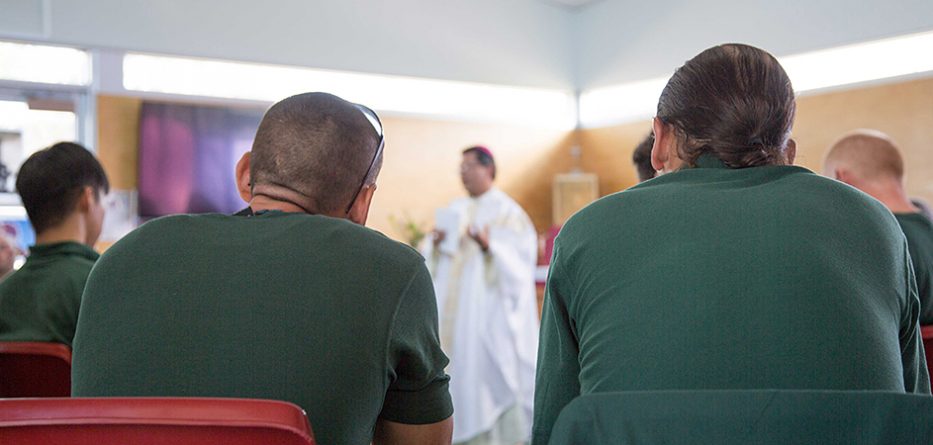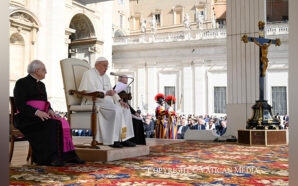Be mindful of prisoners, as if sharing their imprisonment. (Letter to the Hebrews)
That most loveable of popes, St Pope John XXIII, the Pope of the Council, very quickly showed the priorities of his Petrine ministry by being ‘mindful of prisoners’.
His action spoke volumes about his pastoral approach to faith and life. After celebrating his first Papal Christmas Mass in 1958 at St Peter’s, St Pope John XXIII went, without any prior notification, to Rome’s children’s hospital, Gésu Bambino, to visit the children there. The very next day, 26 December, he again left Vatican City to visit the inmates of Regina Coeli prison. When he arrived, he explained: “You could not come to see me so I have come to see you.”
This remarkable event is today also recorded in bronze on the central doors of St Peter’s Basilica in the extraordinary work of Giacomo Manzú. There, in the middle of the left panel, is St Pope John XXIII, stretching his hands through prison bars, grasping the prisoners’ hands while calling them his brothers.
What better place for ‘Peter’ to be than with the suffering and despised! Prisoners are very often the ‘poorest of the poor’ – victims themselves who inflict violence on others, usually responding to violence arising from their own tragic family circumstances; caught up in what Dom Helder Camara named the tragic ‘spiral of violence’.
And our society’s main ‘solution’ is imprisonment! Maybe necessary, but far too often simply used to avoid our Christian responsibilities to provide opportunities for rehabilitation. For prisons are such places of pain and humiliation. Think of those horrible photos, found ubiquitously online, of the cruel, sardonic mocking of prisoners at Abu Ghraib. They remind us that the fundamental basics of dealing with prisoners (binding of limbs, confinement in space and dehumanising rituals) have scarcely changed since Jesus’ time.
In Mark’s Gospel, the soldiers ironically mock what Jesus truly is: the Messiah King. How many other prisoners, like Jesus, would feel themselves at the very centre of ridicule? Being mocked because they were captive, laughed at because they stumbled blindly beneath such power, not able to respond, so those who taunt them are not afraid of them? Part of the humiliation Jesus must have felt was that he saw himself being treated, or mistreated, just like any other prisoner that night (as, for example, the two thieves eventually crucified beside him. No doubt because of that, many Christians take to heart Jesus’ blessing of those who saw him in prison and visited him (Mt 25:36). One man who has responded to Jesus’ call and conducted a remarkable ministry to prisoners, especially to young gang members in Los Angeles, is Jesuit Fr Greg Boyle.
Fr Greg writes about his ministry to and with his ‘homies’ in his book, Tattoos on the Heart: The Power of Boundless Compassion. He quotes biblical theologian Marcus Borg’s observation that the principal suffering of the poor is shame and disgrace. It is toxic shame, Fr Greg says, a global sense of failure of the whole self: “Homies seem to live in the zip code of the eternally disappointing, and need a change of address. To this end one hopes (against all human inclination) to model not the ‘one false move’ God, but the ‘no matter whatness’ of God. You seek to imitate the kind of God you believe in, where disappointment is, well, Greek to him. You strive to live the black spiritual that says: ‘God looks beyond our fault and sees our need.’”
However, he says, “before this can take hold in gang members, they strut around in protective shells of posturing which stunt their real and complete selves”.
Here Fr Greg describes an interaction with a young gang member in one of the ‘rehabilitation’ camps to which the courts remand minors for offences that fall short of felonies:
Often after Mass at the camps, kids will line up to talk one on one. The volunteers sometimes invite the minors to confession, but usually the kids just want to talk, be heard, get a blessing. At Camp Afflerbaugh, I’m seated on a bench outside in a baseball field and one by one, the homies come over to talk briefly. This day, there’s quite a line-up. The next kid approaching, I can tell, is all swagger and pose. His walk is chignon in its highest gear. His head bobs, side to side, to make sure all eyes are riveted. He sits down, we shake hands, but he seems unable to shake the scowl etched across his face.
“What’s your name?” I ask him.
“SNIPER,” he sneers.
“OK, look (I had been down this block before), I have a feeling you didn’t pop outta your mom and she took one look at you and said ‘Sniper’. So come on, dog, what’s your name?”
“Gonzalez,” he relents a little.
“OK, now, son. I know the staff here will call you by your last name. I’m not down with that. Tell me, mijo, what’s your mom call you?”
“Cabron” (roughly translated, ‘bastard’).
There is not even the slightest flicker of innocence in his answer.
“Oye, no cabe duda. But son, I’m looking for a birth certificate here.”
The kid softens. I can tell it’s happening. But there is embarrassment and a newfound vulnerability.
“Napoleon,” he manages to squeak out, pronouncing it in Spanish.
“Wow,” I say, “that’s a fine, noble, historic name. But I’m almost positive that when your jefita calls you, she doesn’t use the whole nine yardas. Come on mijito, do you have an apoda? What’s your mom call you?”
Then I watch him go to some far, distant place – a location he has not visited in some time. His voice, body language, and whole being are taking on a new shape – right before my eyes.
“Sometimes,” – his voice so quiet I lean in – “Sometimes … when my mom’s not mad at me … she calls me …. Napito.”
I watch this kid move, transformed, from Sniper to Gonzalez, to Cabron, to Napoleon, to Napito. We all just want to be called by the name our mom uses when she is not angry at us.
We all just want to be called by the name our mum uses when she is not angry at us. To put this another way, we want to be called by the name that our Creator had for us from the foundation of the world, the name that marks our own lovableness, uniqueness and innate dignity and worth.
We all owe a debt of gratitude to those Catholic chaplains who help prisoners recover their dignity and respect as God’s beloved creatures in need.
Thank God that Catholic Prison ministers like St Pope John XXIII and Fr Greg Boyle, are prepared to visit prisons, which are rarely safe, salutary and sane places, even under the best of regimes. They heed the injunction of the Letter to the Hebrews. May we also be given the grace and courage to ‘be mindful of prisoners’.
This article is part of a series of Lenten reflections entitled A Spirit of Mercy: Reflections on the Works of Mercy by Br Mark O’Connor FMS.
Br Mark O’Connor FMS is the Vicar for Communications in the Diocese of Parramatta.








